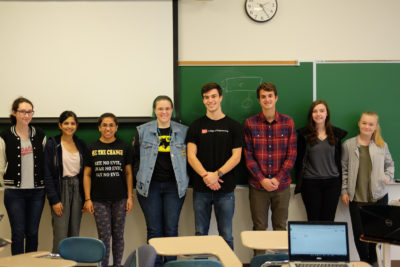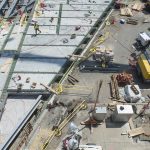
The Boston University chapter of Engineers Without Borders is fundraising to implement a rainwater harvesting system to provide a daily supply of drinking water to the approximately 700 students who attend school every day in the small town of Naluja, Zambia.
The fundraiser, Manufacturing Change in Zambia, began last month with the goal of raising approximately $10,000 by the end of this semester. The campaign has mustered $2,260 from 28 donations as of Saturday, according to the EWB-BU fundraising site.
The club has been working with the community of Naluja for over six years, according to club member and College of Engineering sophomore Ambika Pachaury. The community has almost 15,000 residents and is located in the Southern Province of Zambia. Pachaury said the small town was only recently implemented into Google Maps.
“We go every summer to meet these kids in Naluja, which is a very small, yet spread out community,” Pachaury said. “We try to understand their needs and try to work with them to build sustainable projects.”
Pachaury said this is one of the final projects the club will be doing in Naluja, an endeavor that will be executed this coming summer.
“For two seasons [people in Naluja] have intense rainfall, and after that, they have no water for so many months,” Pachaury said. “Kids have to walk kilometers to get water. The wells there don’t have the best water. There’s a lot of animals roaming around, and it’s an open well that will dry up.”
Ashray Mohan, a ENG junior and a club member, said there is a nine-member executive board that oversees all club operations and coordinates big projects such as this rainwater catchment system.
“The team has partnered up with professional engineers, construction managers, and experts in the field of public health,” Mohan wrote in a Facebook message. “These professionals serve as mentors for the team and guide them in achieving their goals.”
The chapter has already implemented two successful projects since getting involved in the community in 2011, Mohan wrote, the first of which involved building a cell signal amplification system — a feat that brought reliable cell signal to the community health center and maternity ward.
The second of the club’s projects in Naluja involved installing household water filters made from locally sourced materials — a venture that aimed to address the issue of access to clean drinking water, according to Mohan.
Mohan wrote that the rainwater catchment project will be instrumental in preventing dehydration for residents, especially during the summer season.
“Our hope is to introduce this technology in the community as a means of encouraging people to replicate this system on a household level,” Mohan wrote. “The hope is to deliver a clean and adequate supply of drinking water in every household.”
Other members of the Engineers Without Borders BU chapter said involvement in projects like these is vital to the well-being of communities of Naluja’s nature.
Emma Hyberts, a junior in ENG, said there is very little available potable water within the Zambian community, especially during the dry season.
“During the dry season, the main source of water is boreholes, which are deep shafts drilled into the ground to reach underground wells,” Hyberts said. “Hand pumps are used to bring the water from about 15 [meters] below ground to the surface. In the central part of the community, there are two boreholes and during the dry season. One of them tends to dry out.”
Mackenzie Hall, an ENG sophomore, said she thinks Americans often don’t value clean water as much as they should.
“Here in the United States, we take the abundance and cleanliness of the water we drink for granted, while people who are less fortunate as a result of geography or economics don’t have that luxury,” Hall said. “EWB has the opportunity to help this community and bring about a positive change in the lives of the people who live in Naluja, and it is this potential for positive change that makes this cause so important.”
Matt Boucher, a sophomore in ENG and the technical lead for the rainwater technical team, said without funding, the project could not be done to the level the club hopes.
“Our project is hinged on long-distance travel as well as a great deal of materials and labor, all of which cost money,” Boucher said. “Our ultimate goal is to provide the Naluja community with a sustainable, efficient and sufficiently large system to sustain its people for as long as need demands.”





These sustainable efforts by our future scientists are remarkable and highly appreciated.?
Good luck to all?